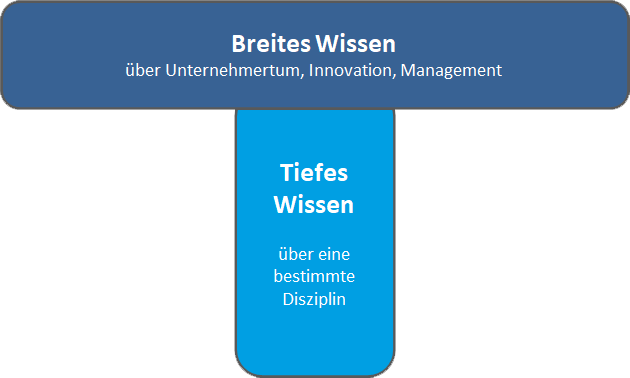In times of constant change and digital transformation, innovation is becoming an essential factor in corporate strategy for many companies. The job description of an innovation manager was created in order to optimally accompany and control these change processes. But what does an innovation manager have to bring with him to help a company achieve long-term success?
The innovation manager is the pivotal point of entrepreneurial change. With fields of activity in knowledge management, corporate organization, but also the Change Management, he must be firmly anchored in the company and bring with him certain skills that enable him to turn an idea into a product or business model. Three characteristics are particularly decisive for the success of the professional field.
1. Innovation Managers are T-Shaped
The idea of the so-called T-Shaped People originates from the innovation agency IDEO, which has also helped the design thinking breakthrough. The idea behind it is that an innovation manager has a deep foundation of knowledge from a certain discipline and has acquired broad general knowledge about entrepreneurship, innovation and management.

According to this model, innovation managers are experts in a specific area of expertise. If you look around the market, most of them already have several years of professional experience, but the industry is not always decisive. Depending on the mission that a company pursues with its innovation, different disciplines and expertise are relevant for the innovation manager. The key factor in selecting the right candidate is how well he or she can pass on his or her expertise to a team. Too much expertise is not an advantage, however, as it often restricts innovation managers and directs their focus too much to one subject area.
For this reason, the generalist is called upon. Despite specialist specialisation, the innovation manager must be able to create a synthesis between the technical challenge and the general needs. At all stages of the innovation process, he has to hold the threads in his hands and keep an overview. This requires the classic generalist, who takes over the project management from a bird’s-eye view, as well as the specialist who looks through the topic.
The T-shaped form of an innovation manager is of course an ideal image, because it is rarely possible to find an ideal candidate who meets all the requirements. Nevertheless, the mixture is important. An innovation manager, who is only a specialist or a generalist, will find it difficult to achieve his goal and pull the other employees on his side.
2. creative, interdisciplinary and inspiring – soft skills of an innovation manager
An innovation manager must not only be able to fundamentally revolutionize a company. He also needs certain soft skills that can help him with his task. This includes, for example, interdisciplinary thinking. As described in the previous point, an innovation manager must be a generalist. He must be able to think his way into the different departments and their requirements and react to them. In order to do this, he not only needs a high degree of curiosity, but also an open-mindedness towards new requirements.
But a good innovation specialist also needs strong leadership skills. In the rarest cases, working in an innovation team is a simple matter. As a manager of such a team, you have many different personalities with different requirements and ideas, who expect a direction of action from the management. However, not all members of the group always pull together. Innovation managers must therefore not only have good powers of persuasion, but also a high frustration tolerance, because only in the fewest innovation projects does it work immediately as it is ideal-typically desired.
3. innovation managers as communication experts
The necessity to assert oneself in the innovation team makes the last characteristic of the innovation manager almost its most important. He needs to know how to talk to people. In order to do this, he needs not only a charismatic appearance and professional persuasive power, but also a good knowledge of human nature.
The innovation process is not only about convincing the employees of an innovation, which is rarely a simple task, but the innovation manager must also involve the customer in all processes. This requires a skillful hand in customer communication. Managers must identify problems on the user or consumer side at an early stage and receive as much information from them as possible.
An innovation manager therefore needs the ability to communicate with different types of people and professional and social strata in order to shape the innovation as well as possible.
Even though very few people have all these qualities, you can learn them right from the start. If you need help with this, please write to me, I will see how I can support you on your way to becoming an innovation manager.

